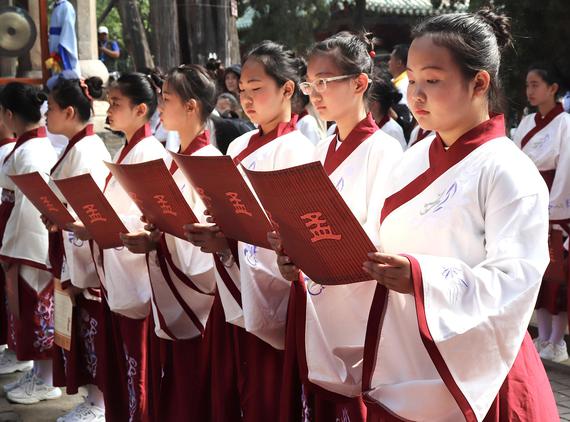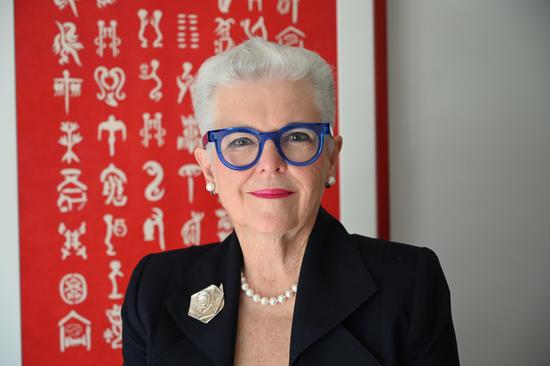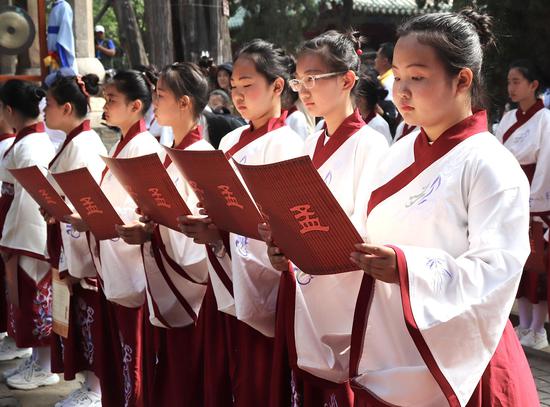(W.E. Talk) Jenny Shipley: Looking back toward the future through a Mencius lens
By Jenny Shipley, former Prime Minister of New Zealand
I am not an expert in Confusion or Mencius thought, but I am intensely interested in the history of civilizations, their evolution and their application to the challenges and opportunities we face today.
In New Zealand, our Māori people have many sayings or whakatauki that we often reference. “I walk backwards into the future with my eyes fixed on my past”. We can deliberately look to the past, to inform the future through a Mencius lens.
There are three questions we are facing today: the first is “What makes effective leaders, fit for the future”; the second is “What is unique about the Asia Pacific approach”; the third os “What must we take into account as we embrace new technologies like AI, and the global challenges it presents”. What is clear to me is that in applying a Mencius lens of Oriental Civilization they cause you to pause, reflect and consider.
The leadership and the future
Highly effective leaders are an essential ingredient for the future success of us all. Mencius insight into benevolence, assumes that everyone has goodness at their heart, but he also urged leaders to know themselves first, to learn from and respect those in authority including the importance of family, and by extension then apply these thoughts and insights to community and the world.
If the leaders applied these simple parameters today, we would seek to undertake significant self-reflection and self-improvement and before proceeding to make important and far-reaching decisions that could have potentially significant unintended consequences. This requires a focus on personal accountability, professional integrity, and moral leadership and where present, either historically or in a modern world, has the best chance of building a secure and prosperous nation that citizens will respect and wish to contribute to.
Mencius thoughts on benevolent governance while promoting economic endeavour and success, goes further and advocates for leaders act with compassion and justice toward their people. He argued when leaders care for their citizens’ well-being and prioritize moral governance that is well understood by a nations people, it fosters confidence, loyalty, peace, and long-term stability, values still highly prized today.
In every nation, the heart of social stability lies the role of the family in most civilizations. Mencius emphasizes the role of family as the basic unit of society. Today, where fragmented social ties are found in many countries, we are seeing the tragic consequences of the break down and dislocation of their families and its impact on communities. We must accept that the modern family is diverse but will still benefit from focusing on family values and community building without moral judgment, in order to help repair and strengthen the social fabric of society.
While globally, modern society tends to emphasize equality, human rights and inclusion, Confucian values of respect for hierarchy and authority remain applicable, especially in the context of organizations and governance. In our global rules-based system we have an agreed framework, though it only functions successfully when all of us who participate have respect for the institutions and are willing to be bound by their agreed outcomes. As individuals and within nations we need to remind ourselves that we need to respect the authority of these shared institutions and their traditions, while also maintaining a balance with global obligations, and our sovereign independence, if we are to define a meaningful shared future for us all.
Mencius assist us here with his Middle Way and the extension of his concepts to a global context. In the latter part of last century, we lived through a period of 40 plus years where accommodations, concessions and inclusion were the prevailing themes of global engagement. This approach delivered unprecedented economic prosperity and global security for most parts of the world.

Today we are facing economic confrontation and challenge, climate events of highly disruptive proportion, global debt concerns, massive technology disruption and internal conflict in many nations, exacerbated by the growing gap between the rich and poor. In this time, we again find ourselves needing to urge all individuals and nations to work to avoid extremes in thought and action that may lead to unintended consequences and to urge cooperation among nations, to address global challenges together. In today’s polarized global environment, the middle way could help bridge divides by encouraging dialogue, compromise, and measured responses.
In my experience this does not require total agreement but a shared understanding of perspectives, rather than being slaves to the past grievances and divisions, conquests, and misunderstandings. This requires gifted leadership in action, and it is possible.
Learning from the cooperation between the Asian countries
The Asia Pacific region is home to 60 percent of the world’s population. Oriental Civilizations are dominant across the region, but other diverse cultural, religious, and political systems are also highly visible. This has not prevented constructive and successful collaboration. Countries such as Singapore and China have, in some ways, incorporated Confucian principles in their governance models to balance economic growth with social cohesion, while driving for modernization and avoiding social fragmentation.
Pacific nations also have strong cultural ties which puts great weight on family, social harmony, respect for authority and traditions. The Pacific Island Forum offers a good example where the leaders seek to achieve a meeting of minds using benevolent governance, to guide their diplomatic approach, by encouraging countries to work together for mutual benefit, with a focus on cooperation, peaceful resolution of conflicts, and shared prosperity and have achieved significant success in doing so.
APEC also offers an interesting example off oriental thought leadership where nations large and small, meet on the basis of cooperation and share an ambition of achieving shared prosperity across the region by agreeing to focus on the common interest in trade, market access, the administrative simplicity. They also pursue efficiency of supply chains and regulations, and a focus on problem resolution by working together for the mutual benefit.
The ASEAN economies have enjoyed similar success by taking this type of cooperative approach These models of collaboration rely of relationships, good intentions, and a determination to deal with the challenges facing the respective economies within the region.
By pursuing and fostering leadership that is compassionate, just, and responsible, the ideas of Mencius have direct relevance in helping modern societies in the region. Asia in many respects continues to demonstrate this is possible and as it is very likely to continue to be a global engine room for development and growth in the years to come, it is hoped that nations in the region will look to mutual benefit and collaboration as the motivating force for the regions development thus avoiding division.
Grasping the opportunities and managing the risks posed by AI
I have been reflecting on what Mencius’ philosophy might offer when considering the future implications of artificial intelligence (AI). In the current development framework, it feels like his emphasis on human nature, moral responsibility, and benevolent leadership is missing.
His guidance is useful here if applied in the modern and dynamic context. He might say:
We urgently need and industry wide commitment to human-centred AI development;
We need rules and guidelines defining ethical governance and transparent accountability of AI;
Industry leaders must be held moral responsibility in the design and control of AI algorithms and in crucial decision-making around its function and application;
The public and private sector must be active in educating their population and work on consensus building around the use of private data.
The Mencius view of the Middle Way will be critical in the future shaping of AI and the environment in which it will function. While AI can bring efficiency and optimization, leaders must ensure that AI compliments human decision-making rather than replace it entirely.
Mencius belief in the inherent goodness of human nature cannot take this for granted in the development of AI. As a starting point, I believe we must accept that AI systems are neither inherently good nor bad. Its application and impact depend entirely on how these systems are programmed and used. The innovators and entrepreneurs must take responsibility here to see that AI does not get ahead of human consideration. Public regulators must catch up. Otherwise we can only hope that industry takes a self-regulating approach based on human centred values and thinking.
Mencius’ considered thoughts and wisdom from one of the oldest periods of early civilization, reminds us that we all have a leadership obligation, and offers a moral and ethical framework that remains highly relevant as we consider the complex but exciting future ahead of us.
Leadership is not the responsibility of a few. I believe we are all leaders. There is much we can learn from Mencius as we take on this responsibility and challenge. If each of us leads from where we are, a profound difference can be made to the benefit of people everywhere.
As we look back toward the future, we are shaping our respective civilizations everywhere. As we do so, I am reminded of a treasured Whakatauki or saying of our ancient Māori culture which they hold dear, and which asks “What is the most important thing in the world? And they reply “He tangata, He Tangata, He Tangata- It is people, it is people, it is people!”
We are fortunate to be able to stand on the shoulders of those who came before us in well-developed and such successful periods of history, such as the Oriental Civilizations and others equally rich civilizations, can offer us.
We can learn from their foresight and wisdom but, what we do next, will define whether we to can contribute to the rise of our national and global civilizations, as that generation did. I believe it is not what we have done, it’s what we do next that will define this generations contribution.
Edited by Wang Zonghan
2024.11.25


